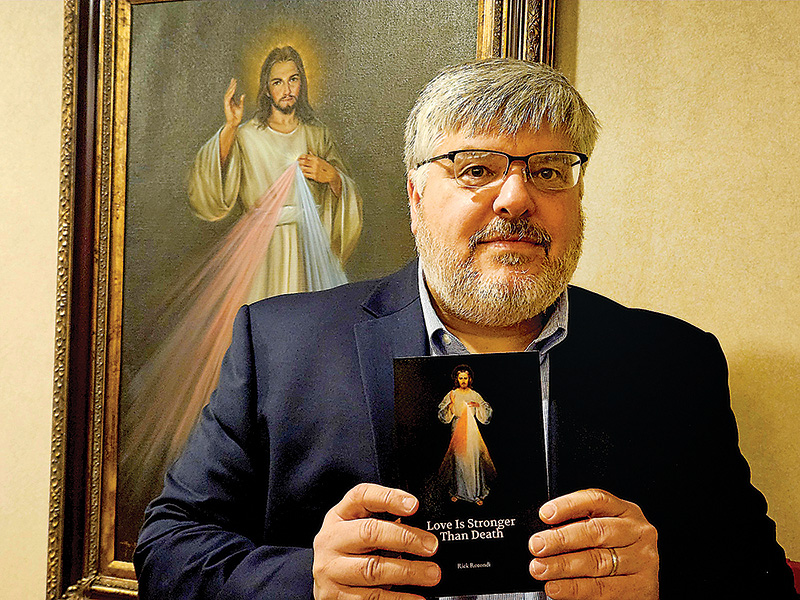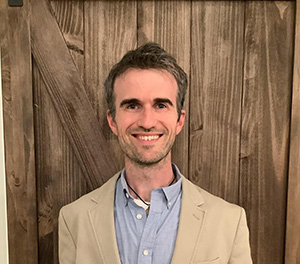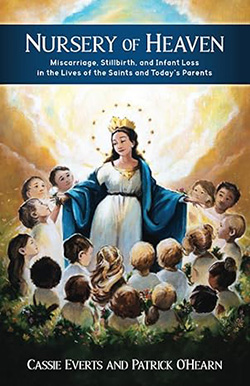Local publishing veteran releases ‘Love is Stronger than Death,’ a memoir about faith, loss and hope
 Rick Rotondi’s spiritual memoir, “Love is Stronger Than Death,” details how his lifelong interactions with the Catholic Church, the guidance he received through his work at local Catholic publishing houses, and the advice of spiritual mentors helped him navigate the death of his only daughter, Olivia. (Photos submitted)CHARLOTTE — Veteran Catholic publisher and founder of Cenacle Rick Rotondi takes readers on a mystical journey of love, faith, mercy and grace in his recently released spiritual memoir. “Love is Stronger Than Death” details the death of his only daughter, Olivia, and shares a father’s ability to cope through faith.
Rick Rotondi’s spiritual memoir, “Love is Stronger Than Death,” details how his lifelong interactions with the Catholic Church, the guidance he received through his work at local Catholic publishing houses, and the advice of spiritual mentors helped him navigate the death of his only daughter, Olivia. (Photos submitted)CHARLOTTE — Veteran Catholic publisher and founder of Cenacle Rick Rotondi takes readers on a mystical journey of love, faith, mercy and grace in his recently released spiritual memoir. “Love is Stronger Than Death” details the death of his only daughter, Olivia, and shares a father’s ability to cope through faith.
In Rotondi’s memoir, he divulges how his lifelong interactions with the Catholic Church, the guidance he received through his work at local Catholic publishing houses, and the advice of spiritual mentors navigated him, in his words, through his own “Via Dolorosa” of bereavement.
“The book is an inspiring example of how in the midst of tragedy God is there under many disguises and how His channels of grace to us are unlimited and unexpected,” stated retired publisher Bob Gallagher in a review.
Olivia, 25, was a gorgeous ECU graduate, an alumna of Charlotte Catholic High School, a volunteer at Holy Angels and a teacher assistant at St. Ann School who secretly suffered from anxiety and depression.
 OliviaOn the morning of May 5, 2022, Olivia was missing for hours, prayer lists started, and the search began. Rotondi eventually located her car at a hotel. When police were dispatched, they found Olivia lifeless – she took her own life. The traumatic scene prevented Rotondi, his wife Melanie, Oliva’s mother, and her brother Tim from saying goodbye. They could only wait grief-stricken for answers in the room across the hall.
OliviaOn the morning of May 5, 2022, Olivia was missing for hours, prayer lists started, and the search began. Rotondi eventually located her car at a hotel. When police were dispatched, they found Olivia lifeless – she took her own life. The traumatic scene prevented Rotondi, his wife Melanie, Oliva’s mother, and her brother Tim from saying goodbye. They could only wait grief-stricken for answers in the room across the hall.
Within minutes, Father Timothy Reid of St. Ann rushed in and stood with the Rotondi family, shoulder to shoulder, praying the rosary. Soon after, St. Matthew pastor Father John Allen arrived, granting Olivia an Apostolic Pardon from behind her locked hotel room door, where only God could meet her the rest of the way.
“Sacraments are for the living; we didn’t really know Olivia’s status,” Rotondi said. “For Father Allen to give that Apostolic Pardon through the door, I’m so grateful for that.”
Rotondi believes, just like the name of his own company, Cenacle, that Jesus was able to enter the locked doorway man could not.
“There is only one reason we exist: to be a saint. He took her to His House. He chose that moment. It could have been another moment. He could have saved her, but He didn’t because that was the moment she became a saint,” Rotondi said. Rotondi considers suicide a grave sin but is steadfast Olivia is in heaven, “not presumptuously” but through God’s mercy.
Rotondi’s book details how God had prepared Rotondi for this moment. During his 32-year publishing career Rotondi encountered the Divine Mercy Chaplet too often for it to be mere coincidence. The book reveals just how important a role the chaplet played in the weeks prior to Olivia’s death.
Years before, the Order of Malta tasked themselves to assist in comforting retired Bishop William Curlin during his dying days, which later became another pillar of support provided by God for Rotondi.
“We would watch television together, eat together and have Mass at his home chapel. It was like an extended retreat for me with a spiritual director from Mother Teresa. I was able to hear all the stories of his life with Mother Teresa,” Rotondi stated.
The memoir describes the beautiful bond formed between Rotondi and the bishop, and how the teaching of St. Teresa of Calcutta spiritually lifted Rotondi during his bereavement.
A flock of fathers who left their stamp on the Rotondis’ lives assembled themselves for Olivia’s funeral. Father Benjamin Roberts from Our Lady of Lourdes, Abbot Placid Solari from Belmont Abbey, Father Allen, Father Reid, chaplain of Holy Angels Father Dennis Kuhn and Father Joshua Voitus from St. Vincent de Paul shared in his loss and recounted anecdotes of joy about Olivia’s life. Plus, long-term friend and CEO of TAN Books Conor Gallagher, who fathered 16 biological children, and James Hetzel from The Catholic Company with his own tribe of nine, gave
Rotondi the ultimate reassurance needed during the burial – that he was a great father.
“I admire Rick, and I admire Olivia’s family greatly. They are people of deep and profound faith,” Father Allen said.
Rotondi is not the typical grieving dad. “I don’t have a wound that needs treatment. I encourage anyone who is grieving to turn to the great priests and ministries in our Church,” he said.
For Rotondi, Olivia showed herself through cardinals, rainbows and butterflies, urging him to write her testimony because she was unable to do it herself.
“I wanted to say thank you, and Olivia wanted to say thank you. This was the way I could do it, and now it is in His hands for whatever He wants. If it can help one person or give consolation, praise God,” Rotondi said.
In 2016 Rotondi visited St. Peter’s Basilica for the Jubilee Year of Mercy, not understanding at the time how that mercy would play out in his own life. This year, he will travel with Melanie to Italy and Rome as Pilgrims of Hope for the Jubilee Year, seeking hope for Olivia’s salvation, hope for his family, and hope for those grieving a suicide.
Read the details of Olivia’s final days and Rotondi’s experience with God’s mercy in “Love is Stronger Than Death.” The memoir also includes the Divine Mercy Chaplet, which Rotondi encourages any family dealing with the death of a loved one to pray.
— Lisa Geraci
More online
At www.cenacle.tv/love: Buy “Love is Stronger Than Death” from this website or from your favorite bookseller
Find solace in ‘Nursery of Heaven’
 LINCOLNTON — Even amid an outpouring of condolences, grief can leave us feeling isolated and misunderstood – particularly when it involves the loss of an unborn child or infant. A local Catholic author wants to offer hope to those who have experienced such tragedies.
LINCOLNTON — Even amid an outpouring of condolences, grief can leave us feeling isolated and misunderstood – particularly when it involves the loss of an unborn child or infant. A local Catholic author wants to offer hope to those who have experienced such tragedies.
Patrick O’Hearn, a member of St. Dorothy Parish in Lincolnton, is shedding light on the suffering of parents who have experienced miscarriage and other forms of child loss, helping them find comfort through the stories of others – including his own.
Readers can find these accounts in “Nursery of Heaven,” O’Hearn’s new book coauthored by Cassie Everts and available from Sophia Institute Press Aug. 20.
“The Holy Spirit wanted me to use my sufferings to help other people, and so that’s when I reached out to Cassie about writing this book with me,” O’Hearn says.
Through a mutual friend, O’Hearn had heard about Everts’ five miscarriages and how she wanted to share her experience to help others.
“God brought us together to write this book,” O’Hearn says.
“To share my own grief and journey, knowing someone is carrying the same cross, really helped,” Everts adds. “When I experienced my own miscarriages, I never had felt so isolated and alone. I didn’t know where to turn, what the Church offered, or who to ask for help – my prayer is that ‘Nursery of Heaven’ will provide those answers for other women and couples.”
In the pages, readers will find the stories of Sts. Louis and Zélie Martin, St. Gianna Molla, and Servant of God Chiara Corbella Petrillo as well as those of Everts, O’Hearn and his wife Amanda, and other modern-day couples. Each shares the realities of losing a child and the consolations God has given them.
“When you lose a child, there’s a sense of isolation, especially when you’re in parishes where everyone else is having a lot of children, because that can be painful,” O’Hearn says. “Priests do their best but sometimes don’t know what to say, so you just feel like you’re carrying this hidden cross.”
Everts adds that there is never a quick fix or easy words when someone is experiencing the loss of a baby. They want their book to be a helpful resource and source of comfort.
 Besides the personal stories, the book has prayers such as the “Blessing of Parents after a Miscarriage or Stillbirth,” “Order for the Naming of an Infant Who Died before Birth,” Scripture passages and novenas.
Besides the personal stories, the book has prayers such as the “Blessing of Parents after a Miscarriage or Stillbirth,” “Order for the Naming of an Infant Who Died before Birth,” Scripture passages and novenas.
Both authors also recommend attending a Mass of Consolation like the one to be held this fall at 9 a.m. on Saturday, Nov. 16, at St. Mark Church in Huntersville.
“Often people won’t say anything at all, or say that you’ll have another child, and so that’s why many parents are so private about it, but here’s a book where people are pouring their hearts out,” O’Hearn says. “You’ll realize that reading it gives a little touch of grace in your heart.”
Everts’ message to women going through such a loss: “May you find comfort knowing that your baby is in heaven and never forget the powerful intercessor they now are before the throne of God. And while the world may have never known this beautiful child, our hearts never forget the life we were blessed to carry, no matter how short the time was, and the honor it is to be their mother.”
— Annie Ferguson
Order and learn more
At www.sophiainstitute.com: Buy a copy of “Nursery of Heaven”
At www.patrickrohearn.com: Get to know the author and St. Dorothy parishioner

